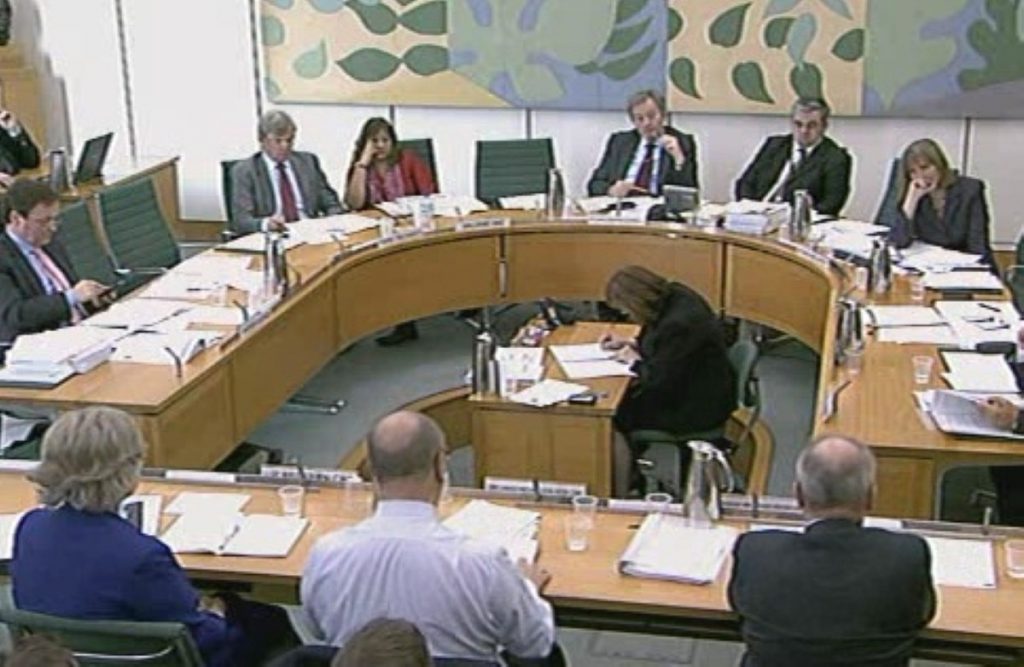Sketch: NHS chief David Nicholson brushes aside patient deaths
This was the moment they had been waiting for. The families and friends of the patients who died unnecessarily in the NHS – especially the 1,200 patients who lost their lives while supposedly under the care of the Mid-Staffordshire NHS Trust between 2005 and 2009 – have spent years frustrated and angry at the seemingly endless abilities of the NHS' most senior official, Sir David Nicholson, to evade responsibility. They have found it impossible to understand how Nicholson – who was the chief executive of the West Midlands Strategic Health Authority at the time of those deaths – could possibly not accept the most basic principle of accountability and resign for what happened on his watch. Today he faced MPs on the Commons' health select committee. It was a big day for all concerned.
They might have expected at least a degree of contrition, a shred of humanity. What they got was farce. "I'm absolutely sure there is somewhere in there an apology," he muttered. A while later, he was able to do what even the most unabashed ministers have not yet succeeded in achieving: saying sorry while being triumphalist. "There is an apology," he announced, pleased that the bureaucratic systems which administer his remorse were functioning effectively once again. "It's on page three."
This removal from reality, it turns out, is both Nicholson's governing trait and the shield that protects him from actual responsibility. What everyone had got wrong, he explained, was the idea that, somehow, the NHS could be viewed as an "organisation". All those billions of viewers of the Olympics ceremony must have been sorely disillusioned to come away with the idea this was some sort of homogenous entity, then. "People see the NHS as an organisation, when it actually isn't. It's a healthcare system," he explained. "The system is built up to make that accountability at hospital level. The primacy for accountability at Stafford hospital was that particular hospital. Those individuals were held to account."
It's like the commander-in-chief of a brutalising army insisting that accountability is at brigade level. Or the chairman of a rainforest-destroying multinational corporation explaining the buck for all those oil spills stopped somewhere in the finance division. Or, worst of all, a minister saying accountability ends at that civil service office block outpost in Swansea. Let's hope there were no secretaries of state watching the Nicholson gambit today: if they choose to take on his line of defence, our entire system of government is about to collapse.


Nicholson is a man who spends his days removed from the NHS us ordinary mortals every so often rely on to fix us up – and demonstrated that distance this morning. "Of course I know patients die in hospital," he snapped at one stage. "Under good circumstances, sometimes," he said, brightening . He was talking about end-of-life care, but the instinctive headslap of all those in the room had already been completed.
That flicker of bad temper kept recurring. He evidently felt this whole process was a bit unnecessary. Labour's Valerie Vaz was taking him through his statement, making him zip over to page 12, paragraph 136. He didn't like her brisk pace. "I spent 11 hours being questioned by a QC," he complained, instead of trying to find the relevant section to answer her question. He added sarcastically: "To help you, there is more evidence available if you want it."
Nicholson's veneer of polite cooperation was wearing very thin. So was MPs' anger. "It's a funny old trick, when people go into the witness stand saying 'I can't remember'," Vaz observed. She sounded as if she had acid in her voice. "It's not a trick," Nicholson protested. "I was responsible for 54, 56 organisations". (Subtext: so many organisations I can't even remember how many there were). "About two-thirds of them I'd literally never been involved in before in my life. They were brand new to me. I was going through this for the first time. It's not a trick."
Nicholson's most eyebrow-raising defence was his own contribution to the "management babble" Lib Dem Andrew George had complained about. "I coined a phrase," he explained, sounding very pleased with himself – "'hitting the target but missing the point'". He put things wrong when he spotted them. He even talked to patients and staff when he visited hospitals. So there.
Whatever he did, it didn't work. Hundreds of people lost their lives in the hospitals Nicholson was charged with overseeing. "We were taking through a set of changes which was very difficult – changing staff, losing corporate memory – – but [it was] done in an organised and planned way," he explained. Does he really expect the families of the victims to simply turn around and say: 'That's alright, then'?












